Welcome to our column, Russia Update, where we will be closely following day-to-day developments in Russia, including the Russian government’s foreign and domestic policies.
The previous issue is here, and see also our Russia This Week story The Guild War – How Should Journalists Treat Russian State Propagandists? and special features ‘Managed Spring’: How Moscow Parted Easily with the ‘Novorossiya’ Leaders, Putin ‘The Imperialist’ A Runner-Up For Time’s ‘Person of the Year’ and It’s Not Just Oil and Sanctions Killing Russia’s Economy, It’s Putin.
Protesters have come to the home of Ksenya Sobchak, a popular Russian talk-show host, complaining about her tough questions to President Putin about the burning of homes of terrorists’ relatives in Chechnya. Now she’s threatened with a libel suit by Chechnya as well, and more homes continue to be destroyed.
Please help The Interpreter to continue providing this valuable information service by making a donation towards our costsâ€.
UPDATES BELOW
Russia’s Investigative Committee (IC) opened a criminal case on charges of embezzlement against Aleksandrina Markvo, the common-law wife of Vladimir Ashurkov, former director of the Anti-Corruption Fund of opposition leader Alexey Navalny, TV Rain reported, citing the IC’s web site.
The case is related to Markvo’s organization of a series of events and literary competitions called “News from the Classics” to raise the profile of the Russian classics with public readings in parks. Russian authorities believe that a portion of the funds for the project, which involved 7 contracts with the Federal Agency for Press and Mass Communications and the Department of Mass Media and Advertising of the city of Moscow totalling 13 million rubles ($233,475) and 51 million rubles ($915,941) respectively, was used to fund the opposition.
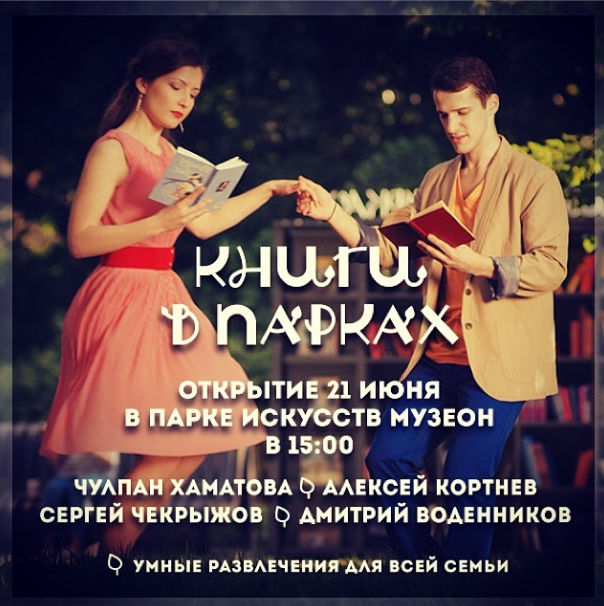
The move was widely seen as retaliation for Navalny’s anti-corruption work that has targeted top Kremlin officials, as well as a crackdown on liberal intelligentsia associated with the opposition who have led protest marches since 2011.
Markvo and Ashurkov fled Russia earlier this year after charges were made that he had embezzled funds from Navalny’s mayor campaign, and they are seeking political asylum in England. She recently gave birth to a daughter.
According to investigators, Markvo, as the future owner of the company Byuro-17, used free city facilities for holding a literary event although allegedly in official accounts, the space was shown as rented and associated with event costs of more than 2 million rubles (US $36,460).
Investigators claim that Markvo did not hold the festival as claimed, but instead mailed prizes to the awardees or told them to pick them up, and then embezzled the funds to use for personal purposes. She is accused of not providing four prizes that were supposed to be more expensive items like a laptop or tablet, but instead giving out electronic book readers, and pocketing the funds.
Writers and other creative intellectuals who were in the Coordinating Council of Opposition and the League of Voters took part in the competition and thus allegedly received funds from it.
The project included a web site where organizers described Russian classics with modern news headlines, i.e. “Tragic Death of Doctor in Failed Love Triangle” for Ivan Turgenev’s Fathers and Sons or “Police Inaction Leads to Death of Bureaucrat” for Nikolai Gogol’s The Overcoat or “Double Murder in St. Petersburg; Shocking Facts” for Fyodor Dostoevsky’s Crime and Punishment. The classics can be downloaded for free on the site.
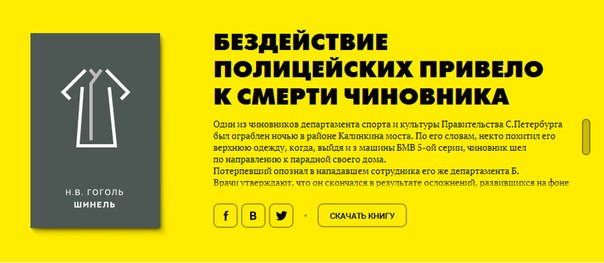
According to Lenta.ru, writers Dmitry Bykov, Lev Rubinshtein, Viktor Shenderovich, Boris Akunin, and television anchors Mikhail Shats and Tatyana Lazareva were among those who benefitted. Rubinshtein and Shenderovich have already been summoned for interrogation. Akunin left Russia after receiving a summons, Lenta.ru reported.
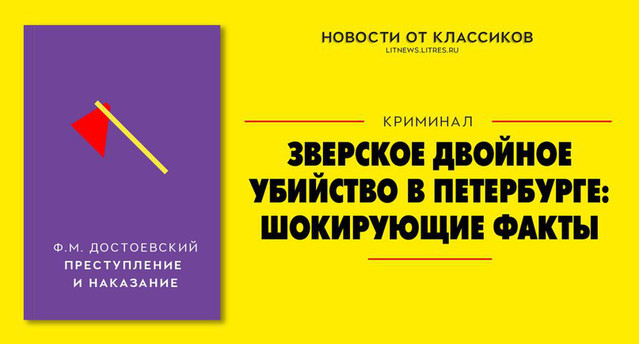
Vladimir Markin, spokesman for the IC said investigators obtained documents allegedly indicating Shats and Lazarev received about a million rubles ($18,057) in 2011 from from Byuro-17; but refused to give testimony, citing Art. 51 of the Russian Constitution, which bars self-incrimination:
Such a reaction forces one to wonder just what these persons did in a project organized by Markvo and her trusted associates, including Vladimir Ashurkov, who gained scandalous notoriety in connection with (Alexey) Navalny’s election campaign.
The tabloid TV channel LifeNews, close to intelligence and law-enforcement, began an investigation of Markvo in November, claiming that she had been using funds obtained from government tenders to finance Navalny’s Anti-Corruption Fund, where her common-law husband, Vladimir Ashurkov, serves as director. LifeNews claimed that Byuro-17 earned 100 million rubles ($182,164) from the state tenders and Ashurkov’s company Slava also allegedly received 30 million rubles ($546,906).
Also to be investigated in the case is Markvo’s driver Andrei Mylnikov and Olga Voznaya, formally listed as director of Slava, although investigators claimed that Markvo was the actual director.
— Catherine A. Fitzpatrick
TV Rain reports that they have a source close to Facebook who said that the blocked Russian page was discussed at the headquarters in California, after which the decision was made not to block subsequent pages of Navalny’s supporters. Volkov also said he had heard the same report.
Facebook is also aware that such lack of action could lead to a full blocking of the social network in Russia, says TV Rain.
Another source said that Twitter also made the decision on December 22 not to block accounts publishing information about Navalny’s supporters. Instead, they will send notices with Roskomnadzor’s request to remove the page, but will not take further action. They’re also prepared for a full blockade from Russia.
Some users, such as Navalny’s former colleague Georgy Alburov, who now lives in exile abroad, report that they’ve received such notices:
The New York Times‘ Moscow correspondent Andrew Roth reported that a
Facebook employee said on condition of anonymity said “the company had
received requests from the Russian government to block other pages
advertising the rally and that so far it had not complied.” The pages
were still under review, the source said.
Russia Behind the
Headlines, a publication of the state-owned Rossiyskaya Gazeta, has run a
story in its English-language edition titled “Facebook and Twitter
Could Be Blocked in Russia Over Navalny Support Pages,” although in fact
Russian officials have not yet made this threat openly.
Authorities also banned pages in the Russian social network VKontakte, along with a number of web sites linking to them, says RBTH.
Organizers
have said in Facebook discussions that if more than 20,000 or 30,000 people show up on Manezh Square in the center of Moscow to protest, despite not having a permit, it will be physically impossible for the police to arrest them all. Moscow police have brought in riot squads from other cities to cope with mass protests in the past, however, and dozens of people who have participated in unauthorized rallies or been accused of disobeying police at those with permits, such as the Bolotnaya Square defendants, have been sentenced to long prison terms.
Only
one other opposition rally attracted that many people this year, a
protest against the war in Ukraine and the forcible annexation of the
Crimea.
Navalny and his brother Oleg were charged with alleged
embezzlement of about $545,000 in a mail order business with the French
company Yves Rocher Vostok, which has denied suffering any losses.
Prosecutors have asked for 10 years for Navalny, taking into account the
additional 1 to serve in a previous case, and 8 years for his brother. The sentence is due to be read out January 15.
Yes, the ruble has recovered over the last week, but it’s still near all-time lows, and the real-feel impact of the currency devaluation is just starting to be felt by the Russian people. Last week we posted pictures of shopping centers packed with Russians hoping to buy goods before their prices increased. Many foreign companies halted sales entirely out of fear that the ruble was plummeting faster than they could change prices.
One such store was Apple, which temporarily took down its Russian website:
Bloomberg has posted an interactive chart of the price of Apple products in Russia since the start of 2014, just one example of skyrocketing tech costs.
For Russians, the ruble’s decline is making foreign goods from electronics and cars to food and clothing more expensive. The price of the U.S. dollar in Russia has risen more than 70 percent this year, from 32.9 rubles at the beginning of January to more than 56 rubles today.
Apple had raised prices in Russia by about 25 percent at the end of November. With the latest increase, the iPhone’s price in rubles has risen 69 percent in less than a month.
The price of commuting to work is also about to go up.
And so is the price of alcohol. Quartz reports that rising prices will hurt beer makers — but vodka may not be affected:
Foreign and domestic brewers alike have been cutting back on their Russian operations, as beer consumption has dropped by an estimated 30% in the last four years. That’s partly due to higher government taxes—until 2011, beer was classified as food, not alcohol. Seven Russian breweries have closed since 2011, including several run by Heineken, Anheiser InBev, and Carlsberg’s Baltika subsidiary…
The shift back toward vodka is also being fueled by new government policies: now that Russia’s economy is struggling more than ever, Vladimir Putin’s government is doing its best to keep citizens from getting too irate. As inflation surged, Russia announced earlier this month that it would not raise the government-mandated minimum price for a bottle of vodka, which currently stands at 220 rubles ($3.88). Illegal, unlicensed vodka, which makes up the majority of the market, is even cheaper.
Prices are going up in restaurants too:
Of course, prices in restaurants may not matter to many average Russians if they can’t afford to go out to eat. As we reported and Business Insider confirms, Russia has halted wheat exports in an effort to drive the cost of food down domestically — but since Russia is the world’s 4th largest wheat producer, that move may have a long-term negative impact on the Russian economy:
Food costs in Russia have soared in the last few months following its ban on imports from the West in retaliation to sanctions. The collapse of the ruble after Russia’s interest rate hike has also made matters worse.
Wheat futures surged to the highest level since May last Thursday after a Russian exports authority only allowed shipments to four countries, even though Russia typically exports to several dozens, according to the Wall Street Journal.
Prices fell into the weekend as investors speculated that European wheat production would make up the offset from Russia. In trading on Monday, wheat futures climbed after the Deputy Prime Minister’s announcement.
The wheat Russia is not exporting would add to its local food reserves in a bid to control prices; the cost of bread has already climbed up to 10% in the past month, according to Bloomberg.
— James Miller
TV Rain reports that Russia’s state TV1 has finally responded to the deluge of criticism it has received for broadcasting a story last summer claiming that Ukrainian forces crucified a toddler in Slavyansk.
The response came after Ksenya Sobchak, a popular talk-show host who also appears on the radio station Ekho Moskvy, asked President Vladimir Putin at his year-end press conference why state television was inciting so much hatred and spreading propaganda, such as the “crucifixion” story.
But instead of really checking that story, the Kremlin’s leading
domestic propaganda channel has distracted from its falsehoods by
citing other stories, some of which are unverified, and others, which are true but distorted to imply that only Ukrainian forces are to blame for
civilian casualties.
TV1 reached new lows on
July 1 when it claimed that after the liberation of Slavyansk, a 3-year-old
boy was nailed to a bulletin board by a soldier in a public square while his mother watched.
The story had first circulated in social media before a refugee woman,
Galina Pyshnyak, the wife of a separatist fighter, told the story for the
camera in a camp in Russia’s Rostov Region.
Ukrainian authorities called for sanctions against the TV station.
TV1’s
Irada Zeinalova said on Sunday’s Vremya [Time] show that journalists
were ostensibly unable to check the “crucifixion” story because they were “not
allowed accreditation to the region of the ATO [anti-terrorist
operation]” — although Russian state reporters routinely defy such bans
to get footage of the war often portrayed tendentiously on federal TV.
Zeinalova deflected criticism of the “crucifixion” broadcast by referencing other deaths (translation by The Interpreter):
“Journalists did not have any proof of this tragedy,
but it was the real story of a really-existing woman who fled the hell
in Slavyansk. What she said goes alongside, is one link in the endless
chain of testimonies. About the fate of dozens of children blown up by
shells, shot while attempting to flee, and dying in airstrikes and
artillery fire.”
TV1 showed footage of a number of scenes of children injured or killed in the war.
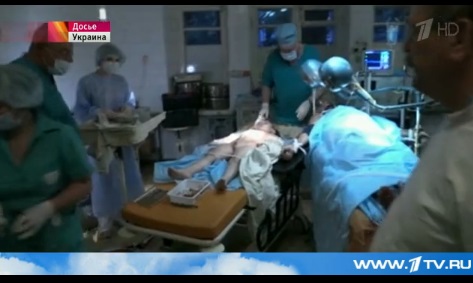
Child war victim on operating table.
More than 4,000 civilians have been killed in the war, mainly by
shelling from both sides in the conflict. And among them are children,
such as the school-boys who were playing on the soccer field at School
No. 63 in Donetsk when a shell landed, killing four of them and injuring
several others. As we reported, the evidence so far suggests that
shells may not have come from Ukrainian positions, but could have been
fired by separatists.
We
follow Ukraine closely in our Ukraine Live blog, but don’t know of any
cases of children shot while attempting to flee towns. Some civilians
have been killed in air strikes of buildings occupied by Russian-backed
separatists in Lugansk and Stanitsa Luganskaya as well as Snezhnoye, but
Ukraine has not used air strikes since July due to heavy losses incurred by separatists supplied with
anti-aircraft weaponry such as the Buk system which led to
the tragedy of MH17.
Zeinalova
was among the journalists who held a TV round-table with Prime Minister Dmitry Medvedev
recently, some of whom complained about the level of hatred on
television. Medvedev responded disingenuously that they were producers
of the news, so it was their responsibility to change it.
— Catherine A. Fitzpatrick
The ruble has gained more than 5% today and is now trading at 56.08 to the US dollar:
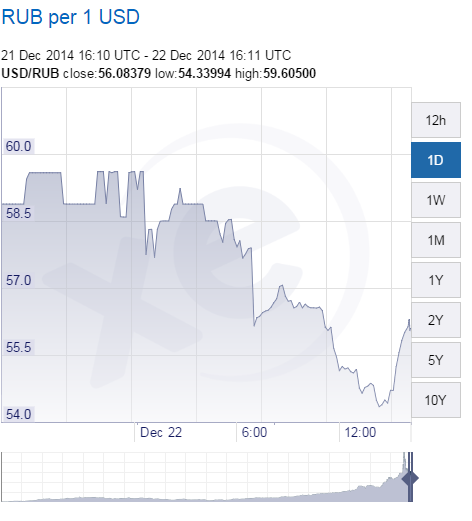
The ruble is also trading at about 69 to the Euro and 87.92 to the British pound.
One key reason for the rally — an announcement from the Russian energy giant Gazprom’s announcement that it will sell foreign currency revenues on the domestic market.
As you can see from the chart, the ruble was doing very well earlier this morning but took a dip more recently, perhaps the impact of the news that the Russian energy giant Rosneft and Morgan Stanley were cancelling a huge deal due to regulatory obstacles. However, Rosneft stock actually rallied because it announced that it had repaid a $7 billion debt earlier in the day. Another possibility for the ruble’s slide in the last few hours — news that Russia’s Central Bank was bailing out Trust Bank to the tune of 30 billion rubles. AP reports:
[The Central Bank] will also place Trust Bank under its own supervision until it finds an investor. Major Russian banks said they had no interest in acquiring Trust, a top 30 Russian bank with about $5 billion in assets.
The problems afflicting Trust Bank follow a tumultuous period for the ruble, which is one of the worst-performing currencies this year, along with the Ukrainian hryvnia. A respected former Russian finance minister warned that the country is headed for “a full-blown economic crisis.”
Still, with all of the moves the Russian government has pulled in the last several weeks, the ruble has stabilized.
But so has the price of oil — for now, but that trend is already reversing. Market Watch reports:
On the New York Mercantile Exchange, light, sweet crude futures for delivery in February CLG5, -2.96% gave up earlier gains and slid 79 cents, or 1.4%, to $56.31 a barrel. February Brent crude on London’s ICE Futures exchange LCOG5, -2.17% reversed earlier gains and was trading 75 cents, or 1.2%, lower at $60.69 a barrel…
Commodity analysts at Barclays said in a note Monday that the slide in crude-oil prices probably isn’t over yet and that they for now are “committed to lower crude oil prices.”
“It would take a close above $64.25 [a barrel] this month to suggest seller capitulation,” they said in a note.
KBC Energy Economics also said it expected absolute energy prices to remain lower through the end of 2015.
— James Miller
Belarus has run out of convertible currency — or at least it has stopped letting businesses and individuals make exchanges at banks and exchange booths. Forex deals are also banned until 2017 except through the National Bank.
Last Friday, December 19, Belarusian dictator Alyaksandr Lukashenka slapped a 30% fee on all foreign currency exchanges, causing Belarusians to race to the banks to try to get rid of their devaluing Belarusian rubles.
Ever since the National Bank of Belarus declared a 30% fee on foreign currency transactions, Belarusian web sites that have reported critically on the story have been blocked from view inside the country.
These include charter97.org, BelaPAN, and Belaruspartisan.org among the leading independent news sites and others.
Charter97.org says that not only is Beltelekom, the state telecommunications operator, blocking their site, but also alternative Internet providers including National Center for Traffic Exchange, Delovaya Set, and Basnet of the Academy of Sciences have blocked their site.
As with sites blocked in Russia and other countries in the region,
Charter97.org tells their readers about a number of ways to circumvent the block, starting with the Opera and Opera Mini browsers.
Dunja Mijatovic, the Representative for Freedom of the Media of the Organization for Security and Cooperation in Europe (OSCE), condemned the web site blockage along with a series of amendments passed today, December 22, making owners of web sites responsible for “extremist content,” and enabling authorities to block sites without notice after two warnings. Unregistered foreign TV programs were also banned, and foreigners are prohibited from owning more than 20% of media.
The Russian energy giant Rosneft and Morgan Stanley have canceled a huge deal, likely due to regulatory obstacles, that would have seen Morgan Stanley selling a significant chunk of its oil trading and storage business to the Russian company.
Today Rosneft released this statement:
Rosneft and Morgan Stanley had to terminate the contract to sell Morgan Stanley’s Global Oil Merchanting business to Rosneft Oil Company dated 20 December 2013 due to an objective impossibility to complete the deal that has arisen as a result of regulatory clearances being refused. Having invested substantial efforts in the deal, the parties regret that it could not be completed. Despite this, the parties continue to cooperate in other spheres.
An “objective impossibility” is likely the lack of approval from regulatory bodies which may have approved such a deal just one year ago.
The collapse of this sale is a huge blow to both companies, but they are also yet another body blow to the Russian economy. And it’s not the only news like this breaking this month. New York Times reports:
The collapse of the sale of the trading unit is the latest energy-related deal to encounter difficulties after tensions arose between the West and Russia over Ukraine. President Vladimir V. Putin of Russian said this month that he was calling off a long-planned giant pipeline called South Stream that was to bring Russian gas under the Black Sea to Europe.
BASF, the German chemical giant, said on Thursday that it was cancelling a planned asset swap with Gazprom, the Russian gas export monopoly, that would have seen BASF’s oil and gas subsidiary, Wintershall, gain stakes in two west Siberian gas fields in exchange for Gazprom taking full control of the of two companies’ gas trading and storage joint venture in Germany.
— James Miller
Demonstrators came to the home of TV Rain’s popular talk show host Kseniya Sobchak to protest her critical questions to President Vladimir Putin at his year-end press conference on December 18 about TV-sponsored persecution campaigns of opposition leaders, the burning of homes of relatives of terrorists in Chechnya
They came bearing signs with the dates and places of terrorist attacks in Russia, and one man held up a large sign in particular that said, “Do You Want Continuations?”
Translation: The Kremlinbots are harassing Kseniya Sobchak.
Sob
“Sobchak” was a trending term on Twitter in Moscow.
Putin replied from his experience as a KGB officer, making generic comments condemning reprisals, but yet seeming to excuse the actions because policemen were killed:
I’ll tell you something from the practical experience of
counter-terrorism units. Generally – I won’t say always – the relatives
of people who commit acts of terror know about them in the overwhelming
majority of cases, if not more. But this does not give anyone the right,
including the head of Chechnya, to resort to extrajudicial reprisals. I
absolutely agree with you on this.
Moreover,
the relevant law-enforcement agencies are now conducting a preliminary
investigation into this. It is necessary to find out who burnt down
houses and killed them (relatives of the terrorists) because they were
wearing masks.
As
for Kadyrov’s statement, it could have been simply emotional, and then
someone seized on it. I understand the emotions because 14 police
officers were killed in this act of terror. It all started with the
murder of traffic policemen. It wasn’t in a firefight. These people were
savagely shot point-blank and many died later on. All in all, 14 were
killed and 38 wounded, some of them seriously.
As
you know, thousands took to the streets to demonstrate. Under the
circumstances, the head of the republic made some emotional statements.
As Yuliya Latynina reported, Kadyrov’s press secretary Alvi Karimov threatened Sobchak with a libel lawsuit immediately after the press conference on LifeNews.
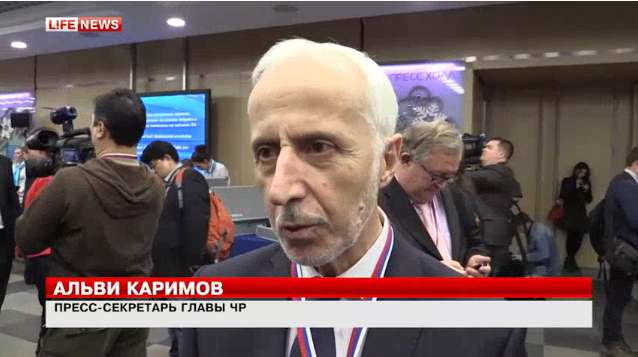
Translation: The response of Kadyrov’s press secretary is not directed at Sobchak, but at Putin. Putin is being shown his place in the vertical command of power (Latynina).
Kadyrov himself brought home the message on his Instagram, where he quoted only part of what Putin said, next to a poster of one of Putin’s more memorable quotes in the speech:
[S]ometimes I think that maybe it would be best if our bear just sat
still. Maybe he should stop chasing pigs and boars around the taiga but
start picking berries and eating honey. Maybe then he will be left
alone. But no, he won’t be! Because someone will always try to chain him
up. As soon as he’s chained they will tear out his teeth and claws.
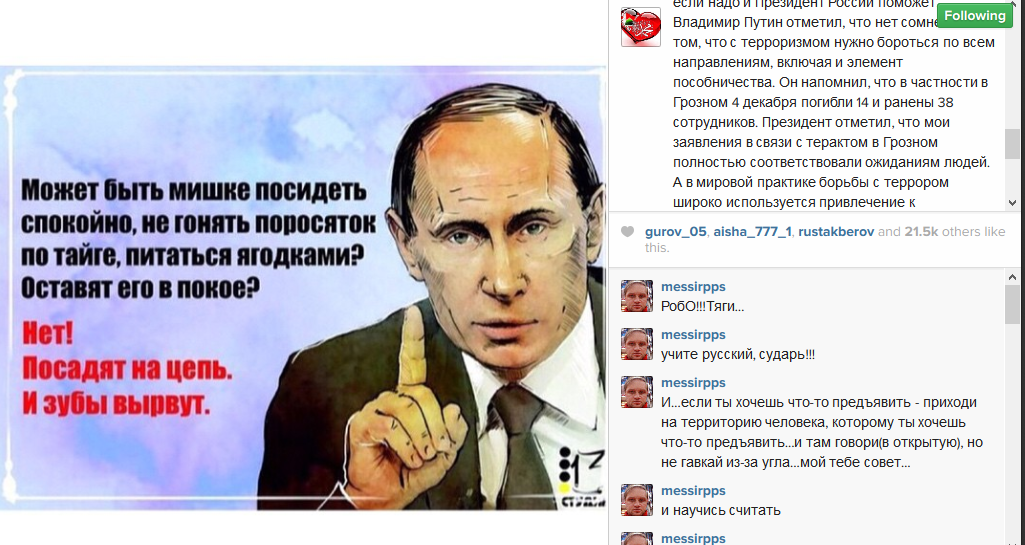
After Sobchak asked her question, Kadyrov’s press secretary Karimov took the microphone and first asked a question about a possible Slavic union, which some found strange coming from a Chechen, and then used the opportunity to claim that Sobchak had “shameless, brazenly lied.” She responded that Kadyrov’s calls to burn down homes was on the record, and Putin’s press secretary Dmitry Peskov interrupted to tell Sobchak to let Karimov speak.
Putin’s reply was reassuring, without actually condemning the house-burning per se:
As for the victims and the families of the dead,
I’m confident that Ramzan will never leave his comrades-in-arms in the
lurch. If need be, we’ll help them as well. This is the first point.
Second, as for complicity, all accomplices must be held accountable but,
of course, it must be done in compliance with the law. Let me repeat,
the preliminary investigation will reveal what really happened there.
But we should combat terrorism all along the line, and that includes
aiding and abetting – there can be no doubt about that. But, I repeat,
this should be done only within the limits prescribed by law.
As can be seen from the transcript, Kadyrov quoted Putin selectively (translation by The Interpreter):
Vladimir Putin touched upon the topic of combating terrorism in Chechnya with regard to the events of December 4. He expressed confidence that the head of the Chechen Republic (Ramzan Kadyrov) will never leave in trouble or in need the families of his combat comrades, and if necessary, the President of Russia will help. Vladimir Putin said there was no doubt that terrorism had to be fought on all fronts, including the element of enabling. He recalled that in particular in Grozny on December 14, 14 officers were killed and 38 wounded. The president noted that my statements in connection with the terrorist attack in Grozny completely corresponded to people’s expectations. And in world practice in combating terrorism, the bringing of relatives of terrorists to account is widely used.
Even so, the President emphasized that this combat must be kept under the law. We totally support the appraisal of events and the tasks placed by the President. We are his infantry and ready to fulfill any order! Now we have become convinced once again that Russia has a great leader who can lead it through the most difficult problems!
But meanwhile, houses kept being burned down in Chechnya, Yelena Milashina of Novaya Gazeta reported December 19.
On the night of December 18-19 in the village of Koshkeldy (the home town of Natalya Estemirova, the human rights activist killed in 2009), the home of the Shabanovs on Sharipova Street was razed to the ground, although they have no relatives in the list of the terrorists who attacked the Press House in Grozny. This was the 13th such house to be destroyed.
Sergei Babinets, a member of the Joint Mobile Group of Human Rights Defenders in Chechnya, whose office was also burned down, said on his Facebook page that he went to Koshkeldy to check the report and took pictures of the ruins.

Site of Shabanovs’ home.
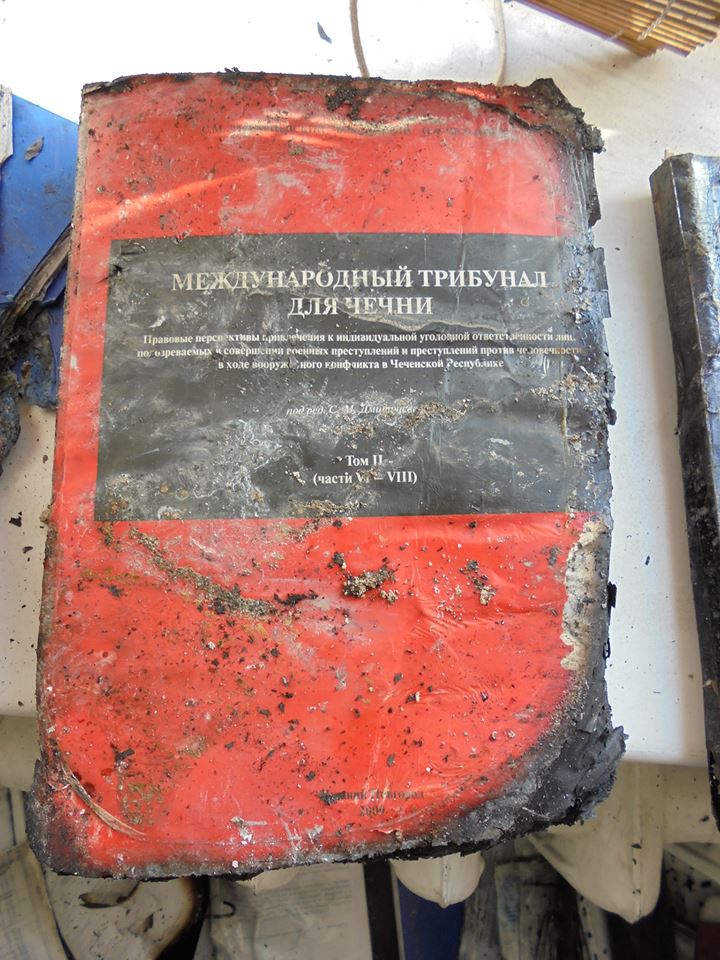
A partially-burnt report from the office of the Joint Mobile Group of Human Rights Defenders of Chechnya, set on fire last week. The title says “International Tribunal for Chechnya” and contains accounts of war crimes. Photo by Igor Kalyapin.